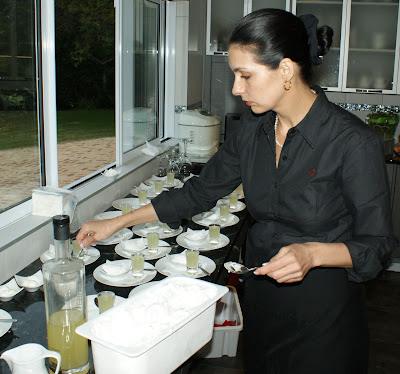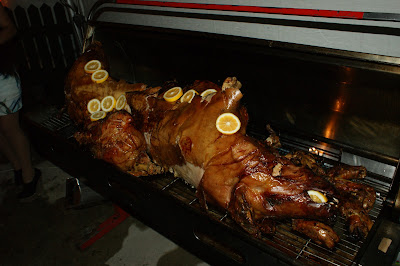Eating a raw food diet is a recipe for disaster if you're trying to boost your species' brainpower.
That's because humans would have to spend more than nine hours a day eating to get enough energy from unprocessed raw food alone to support our large brains, according to a new study that calculates the energetic costs of growing a bigger brain or body in primates.
But our ancestors managed to get enough energy to grow brains that have three times as many neurons as those in apes such as gorillas, chimpanzees, and orangutans.
How did they do it? They got cooking, according to a study published online today in the Proceedings of the National Academy of Sciences.
"If you eat only raw food, there are not enough hours in the day to get enough calories to build such a large brain," said Suzana Herculano-Houzel, a neuroscientist at the Federal University of Rio de Janeiro in Brazil who was co-author of the report.
"We can afford more neurons, thanks to cooking."
Humans have more brain neurons than any other primate - about 86 billion, on average, compared with about 33 billion neurons in gorillas and 28 billion in chimpanzees.
While these extra neurons endow us with many benefits, they come at a price - our brains consume 20 per cent of our body's energy when resting, compared with nine per cent in other primates.
So a long-standing riddle has been where did our ancestors get that extra energy to expand their minds as they evolved from animals with brains and bodies the size of chimpanzees?
One answer came in the late 1990s when Harvard University primatologist Richard Wrangham proposed that the brain began to expand rapidly 1.6 million to 1.8 million years ago in our ancestor, Homo erectus, because this early human learned how to roast meat and tuberous root vegetables over a fire.
Cooking, Wrangham argued, effectively predigested the food, making it easier and more efficient for our guts to absorb calories more rapidly.
Since then, he and his colleagues have shown in lab studies of rodents and pythons that these animals grow up bigger and faster when they eat cooked meat instead of raw meat - and that it takes less energy to digest cooked meat than raw meat.
In a new test of this cooking hypothesis, Herculano-Houzel and her graduate student, Karina Fonseca-Azevedo, now a neuroscientist at the National Institute of Translational Neuroscience in São Paulo, Brazil, decided to see if a diet of raw food inherently put limits on how large a primate's brain or body could grow.
First, they counted the number of neurons in the brains of 13 species of primates (and more than 30 species of mammals).
The researchers found two things: One, that brain size is directly linked to the number of neurons in a brain; and two, that that the number of neurons is directly correlated to the amount of energy (or calories) needed to feed a brain.
After adjusting for body mass, they calculated how many hours per day it would take for various primates to eat enough calories of raw food to fuel their brains.
They found that it would take 8.8 hours for gorillas; 7.8 hours for orangutans; 7.3 hours for chimps; and 9.3 hours for our species, H. sapiens.
These numbers show that there is an upper limit on how much energy primates can get from an unprocessed raw diet, Herculano-Houzel said.
An ape's diet in the wild differs from a modern "raw food diet," in which humans get sufficient calories from processing raw food in blenders and adding protein and other nutrients.
In the wild, other apes can't evolve bigger brains unless they reduce their body sizes because they can't get past the limit of how many calories they can consume in seven to eight hours of feeding per day.
But humans, she said, got around that limit by cooking.
"The reason we have more neurons than any other animal alive is that cooking allowed this qualitative change - this steep increase in brain size," she said.
"By cooking, we managed to circumvent the limitation of how much we can eat in a day."
This study shows "that an ape could not achieve a brain as big as in recent humans while maintaining a typical ape diet," Wrangham said.
Paleoanthropologist Robert Martin of The Field Museum in Chicago, Illinois, agrees that the new paper does "provide the first evidence that metabolic limitations" from a raw food diet impose a limit on how big a primate's brain - or body - can grow.
"This could account for small brain sizes of great apes despite their large body sizes."
But "the jury is still out" on whether cooking was responsible for the first dramatic burst of brain growth in our lineage, in H. erectus, Martin said, or whether our ancestors began cooking over a fire later, when the brain went through a second major growth spurt about 600,000 years ago.
Hearths show up in the archaeological record 800,000 years ago and the regular use of fire for cooking doesn't become widespread until more recently.
But to Herculano-Houzel's mind, our brains would still be the size of an ape's if H. erectus hadn't played with fire: "Gorillas are stuck with this limitation of how much they can eat in a day; orangutans are stuck there; H. erectus would be stuck there if they had not invented cooking," she said.
"The more I think about it, the more I bow to my kitchen. It's the reason we are here."
SCIENCE NOW via Stuff.co.nz

























































